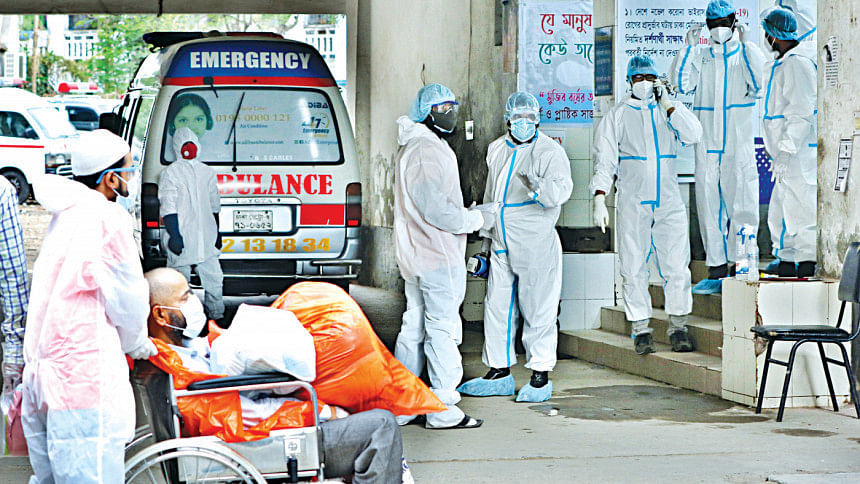Protecting our frontline healthcare workers should be the top priority

Given the existing shortage of healthcare workers (HCWs) in Bangladesh, infection and subsequent exclusion of HCWs from an already strained workforce could leave our health system grossly unprepared for the impending peak of the Covid-19 crisis. According to the World Health Organization, one of the most serious threats sabotaging our ability to control Covid-19 is the global shortage of personal protective equipment (PPE). As high-resource health systems struggle to provide adequate PPE to their frontline HCWs, it is becoming increasingly evident that HCWs in low- and middle-income countries (LMICs) will bear the brunt of this global supply chain shortage.
Despite having one of the best health systems in the world, Italy confirmed that 10 percent of all positive cases of Covid-19 were among HCWs, with 105 HCW deaths. So far in Bangladesh, over 600 physicians have tested positive for Covid-19, according to the Bangladesh Doctors Foundation on May 6. Bangladesh recorded its first healthcare worker death from Covid-19 on April 15. Several hundreds of other frontline HCWs have been infected including 375 nurses, 116 technologists and 62 ward boys. We fear these numbers are likely to increase dramatically as testing efforts are ramped up over the coming weeks.
Frontline HCWs in Bangladesh work in overcrowded environments and have poor infection prevention and control mechanisms, making them more susceptible to contracting Covid-19. With Dhaka being one of the most densely populated cities in the world, health facilities often have up to four persons per ten ten metre square of floor space, partly due to patient caregivers who provide much of the daily nursing duties. This proximity between HCWs, patients and caregivers serve as a dangerous pool for rapid transmission of Covid-19. Moreover, a national survey in 2014 demonstrated that less than two percent of HCWs adhered to recommended hand hygiene techniques, partly due to poor infrastructure and lack of infection prevention and control training.
In the context of these existing baseline pitfalls, the extreme shortage of PPE is yet another deficiency in the arsenal of our HCWs in their fight against Covid-19. In Bangladesh and other LMICs, HCWs are having to reuse disposable PPE without appropriate decontamination, and they are relying on cloth masks during their shifts. This has sparked widespread anxiety amongst many medical professionals, especially as many patients have been hiding their true history due to stigma. In order to maintain a resilient and adequate workforce through the peak of this national crisis, we suggest the following strategies should be adopted.
Firstly, all HCWs working on the frontlines should be required to undergo "refresher" training based on appropriate infection control practices such as those put forth by the Centers for Disease Control and Prevention (CDC). Instead of isolating every HCW inadvertently exposed to patients with Covid-19 and shrinking the workforce, HCWs could universally wear masks and perform strict self-monitoring, isolating only if symptoms develop; a strategy followed in Singapore.
Secondly, HCWs are more concerned about their safety rather than financial incentives. Recognising our limited economic resources, rational rather than "gold standard" PPE use may be applied. For instance, the CDC recommends N95 respirators plus a face shield when caring for Covid-19 patients. The extreme shortage of both in Bangladesh means other strategies, such as the use of medical masks on both patients and providers, can be used instead, with a recent randomised trial showing similar effectiveness. To ease HCWs further, a public health campaign should be adopted to encourage patients to honestly disclose their true history by addressing their concerns, dispelling myths and rebuilding trust.
Thirdly, we recognise that a large proportion of HCWs will inevitably become infected, observing the trend in high-income countries. Given the shortage of testing kits, we believe HCWs should be actively prioritised and systematically tested to identify, isolate and then swiftly reintroduce HCWs following recovery. To maintain an adequate workforce, we emphasise the 7/14 rotation model where different groups of HCWs will rotate each week and then have 14 days of quarantine. This will reduce the risk of exhausting the workforce and allow HCWs to recover physically and mentally.
Finally, it is important to remember that our doctors and nurses are also human. Many are experiencing significant symptoms of anxiety, depression and insomnia as well as the fear of infecting their families, which is particularly problematic in Bangladesh given our multi-family dwellings. Psychosocial support must be offered as they shoulder the burden of this pandemic by putting their lives at risk. This may include routine peer debriefs, crisis hotlines and availability of psychological therapy as needed.
Supporting and fostering a resilient frontline healthcare workforce will be critical during such trying times.
Riashad Monjur is a graduate student at the University of Newcastle, Australia. Dr Md Zakiul Hassan is an Emerging Infectious Disease Researcher and Assistant Scientist at International Centre for Diarrhoeal Disease Research, Bangladesh (icddr,b). All views expressed here are personal.

 For all latest news, follow The Daily Star's Google News channel.
For all latest news, follow The Daily Star's Google News channel. 



Comments